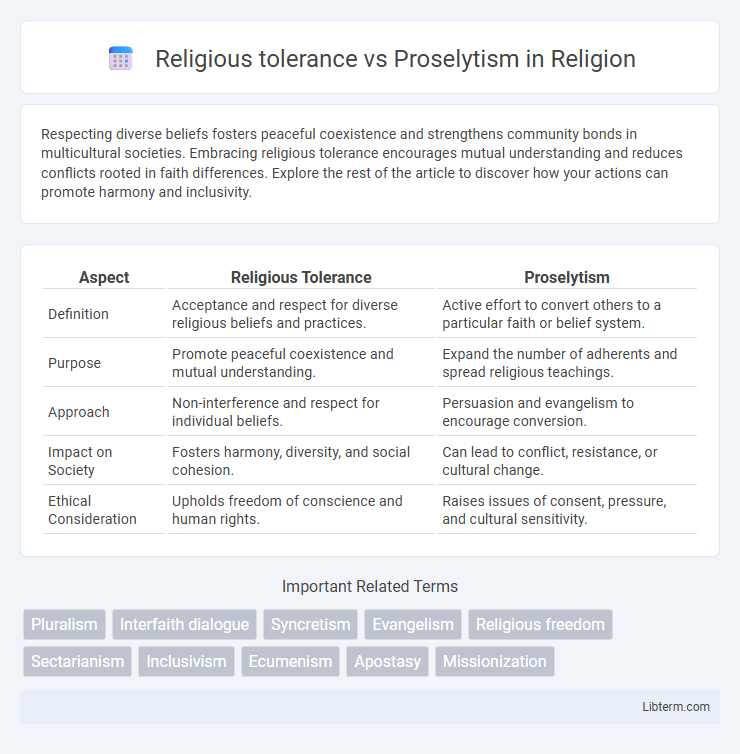Respecting diverse beliefs fosters peaceful coexistence and strengthens community bonds in multicultural societies. Embracing religious tolerance encourages mutual understanding and reduces conflicts rooted in faith differences. Explore the rest of the article to discover how your actions can promote harmony and inclusivity.
Table of Comparison
| Aspect | Religious Tolerance | Proselytism |
|---|---|---|
| Definition | Acceptance and respect for diverse religious beliefs and practices. | Active effort to convert others to a particular faith or belief system. |
| Purpose | Promote peaceful coexistence and mutual understanding. | Expand the number of adherents and spread religious teachings. |
| Approach | Non-interference and respect for individual beliefs. | Persuasion and evangelism to encourage conversion. |
| Impact on Society | Fosters harmony, diversity, and social cohesion. | Can lead to conflict, resistance, or cultural change. |
| Ethical Consideration | Upholds freedom of conscience and human rights. | Raises issues of consent, pressure, and cultural sensitivity. |
Understanding Religious Tolerance
Religious tolerance involves respecting and accepting diverse beliefs without attempting to change them, fostering peaceful coexistence among different faiths. Understanding religious tolerance requires recognizing the importance of freedom of conscience and non-interference in personal faith choices to maintain social harmony. This principle contrasts with proselytism, which seeks actively to convert others, often challenging the boundaries of respect and acceptance.
Defining Proselytism in a Modern Context
Proselytism in a modern context refers to actively attempting to convert individuals or groups to a particular religion or belief system, often involving persuasive communication and organized outreach efforts. It contrasts with religious tolerance, which emphasizes acceptance and respect for diverse faiths without seeking to change others' beliefs. Understanding proselytism requires recognizing its impact on social harmony and the balance between religious freedom and respecting cultural plurality.
Historical Perspectives on Religious Freedom
Historical perspectives on religious freedom reveal a complex interplay between religious tolerance and proselytism, with many societies struggling to balance coexistence and conversion efforts. The Peace of Westphalia in 1648 marked a significant turning point by affirming state sovereignty over religious matters, fostering an environment of limited tolerance while discouraging aggressive proselytism. Throughout history, religious tolerance often emerged through legal frameworks and philosophical shifts, contrasting with proselytism's role in expanding dominant religions, which sometimes led to social tensions and conflicts.
The Role of Tolerance in Multi-Faith Societies
Religious tolerance fosters peaceful coexistence and mutual respect among diverse faith communities by recognizing the right to hold different beliefs without coercion. Multi-faith societies benefit from tolerance as it creates an environment where dialogue and cultural exchange flourish without the pressure of proselytism undermining social harmony. Emphasizing tolerance over proselytism helps prevent religious conflict and promotes inclusive policies that protect freedom of conscience and belief.
Proselytism: Ethics and Controversies
Proselytism, the active attempt to convert individuals to a particular religion, raises significant ethical questions surrounding respect for personal beliefs and cultural diversity. Critics argue that proselytism often crosses boundaries of consent, exploiting vulnerable populations and undermining religious tolerance by imposing one faith over others. Debates intensify over state regulations and the fine line between free religious expression and coercive practices, making proselytism a subject of continuous ethical and legal scrutiny.
Legal Frameworks Governing Religious Expression
Legal frameworks governing religious expression often balance religious tolerance with restrictions on proselytism to protect social harmony and individual rights. International human rights instruments like the Universal Declaration of Human Rights guarantee freedom of religion and belief, while many national laws limit aggressive proselytizing to prevent coercion or public disorder. Courts and legislatures worldwide continue to define the nuanced boundaries between respectful religious tolerance and intrusive proselytism within constitutional and statutory provisions.
Dialogue vs. Conversion: Approaches to Interfaith Relations
Religious tolerance emphasizes respectful dialogue and mutual understanding among diverse faiths, fostering peaceful coexistence without attempting to change core beliefs. Proselytism centers on conversion efforts, aiming to bring others into a specific religion, often prioritizing doctrinal adherence over interfaith harmony. Balancing dialogue with conversion requires navigating the delicate interplay between honoring religious identity and promoting personal spiritual choices in interfaith relations.
Impact of Proselytism on Social Cohesion
Proselytism often challenges social cohesion by creating divisions within communities due to differing religious beliefs and aggressive conversion efforts. It can lead to social fragmentation, mistrust, and conflicts, undermining the mutual respect that sustains religious tolerance. Maintaining social harmony requires balancing the right to share religious beliefs with respect for diverse faith traditions and peaceful coexistence.
Strategies for Promoting Mutual Respect
Promoting mutual respect between religious tolerance and proselytism involves implementing educational programs that emphasize the value of diverse beliefs while encouraging open dialogue without coercion. Community interfaith initiatives facilitate shared experiences and foster understanding, reducing prejudice and misconceptions. Legal frameworks protecting freedom of belief alongside respectful communication norms help balance the right to share faith with the imperative to honor others' religious autonomy.
Balancing Belief Sharing with Respect for Diversity
Balancing belief sharing with respect for diversity requires promoting religious tolerance by recognizing the rights of individuals to practice their faith without coercion or discrimination. Proselytism should be conducted thoughtfully, ensuring that efforts to share beliefs do not undermine the dignity or freedom of others in pluralistic societies. Emphasizing mutual understanding and intercultural dialogue supports harmonious coexistence while allowing diverse religious expressions to thrive.
Religious tolerance Infographic

 libterm.com
libterm.com